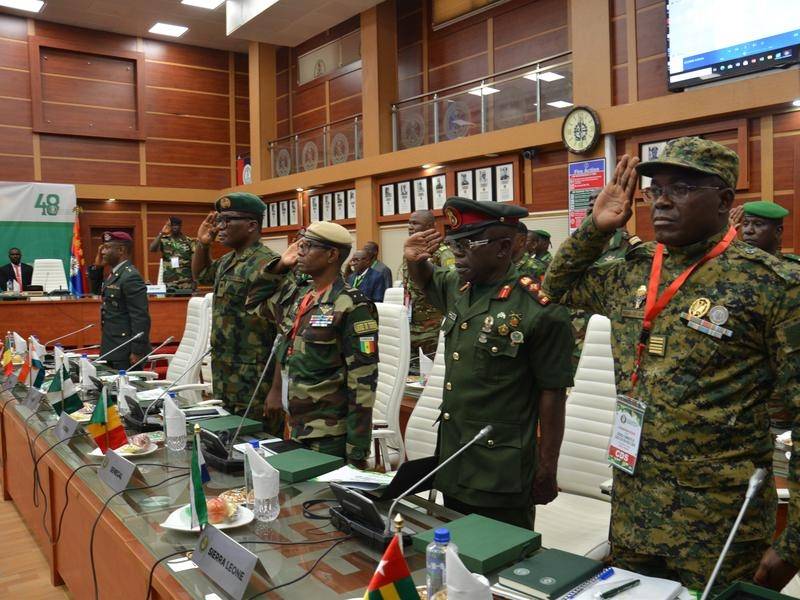
West African military commanders are set to convene on next Saturday to strategize for a potential military intervention in Niger as apprehensions escalate about the confinement conditions of the deposed President Mohamed Bazoum, according to a spokesperson for the regional bloc.
The ECOWAS bloc initiated the activation of a standby force on Thursday, a fortnight after military leaders removed Bazoum from power, marking the seventh coup in West and Central Africa within three years.
The convening of chiefs of staff indicates that West African nations are intensifying their readiness to deploy troops for a potential operation aimed at reversing the coup.
“One (meeting) is being planned for next week,” the ECOWAS spokesperson said. A Nigerian official and an Ivory Coast army source said the meeting would be held on Saturday in Ghana.
The size of the force, the timeline for its assembly, and the decision on whether it will engage in an invasion remain uncertain at this point.
However, the suggested mission has stirred concerns about escalating conflict in a region of strategic significance, where Western influence has waned due to the succession of coups, and where there is a noticeable increase in Russian influence.
ECOWAS, which stands for the Economic Community of West African States, declared that all possibilities were being considered and the organization still maintained the aspiration for a peaceful resolution to the Niger crisis.
Security experts suggested that assembling an ECOWAS force could take several weeks or even longer, which might create a window for potential negotiations.
Among the nations involved, Ivory Coast is the sole country that has specified the number of troops it intends to dispatch. President Alassane Ouattara declared on Thursday that they would contribute a battalion consisting of 850 troops.
On Friday, Benin’s army spokesperson stated that they would contribute troops, though the specific number was not disclosed. Similarly, Senegal had announced the previous week that they would provide troops in the event of an intervention.
The majority of other ECOWAS nations, including regional leader Nigeria, currently holding the rotating presidency, have refrained from making public statements on the matter.
Gambia’s defense minister, Sering Modou Njie, and Liberia’s information minister, Ledgerhood Rennie, informed media on Friday that they had not yet reached a conclusion regarding sending troops.
The military administrations in neighboring Mali and Burkina Faso, both part of ECOWAS, have expressed their intent to support the junta in Niger.
The junta has not responded to ECOWAS’ decision, and there is no sign that it is considering stepping down from power.
Operation ‘Bazoum’
Meanwhile, the African Union, the European Union, and the United States have all expressed growing concerns regarding the detention conditions of Bazoum.
The African Union appealed to the global community to unite in efforts to safeguard the “moral and physical integrity of” of Bazoum and put an end to what it termed the “worryingly poor conditions” of his detention.
Human Rights Watch reported that it had engaged in discussions with Bazoum this week, during which he conveyed that his family’s treatment while in custody was “inhumane and cruel.”
“My son is sick, has a serious heart condition, and needs to see a doctor,” HRW quoted Bazoum as telling them.
Zazia Bazoum, the daughter of Bazoum who is currently in France, informed The Guardian newspaper that the junta was subjecting him to dire conditions in an attempt to coerce him into signing a resignation letter.
The coup in Niger, a nation rich in uranium yet considered one of the world’s most impoverished, holds significant implications well beyond its borders. The country stands as a vital ally for the Western nations in countering Islamist extremists in the Sahel region, making the coup a result of internal political dynamics but carrying wider consequences.
American, French, German, and Italian military forces are positioned in Niger as an integral part of the effort to combat local factions linked to Al Qaeda and the Islamic State.
On Friday morning, the capital city Niamey remained peaceful; however, local residents were irked by the prospect of potential military intervention.
“Deep down inside, I’m not afraid, I’m going about my business. I think this is just blackmail,” Balla Souleymane, said of ECOWAS’ decisions.
Following the coup, a substantial number of Nigeriens have attended rallies orchestrated by the junta to display their backing for the military leaders. They have also criticized Western nations while praising Russia, which echoes the responses observed after recent coups in Mali and Burkina Faso. In those instances, the military juntas expelled French forces upon assuming control.
Protests have been directed at the embassy of France, the former colonial power, in Niamey.
France affirmed its complete endorsement of all the outcomes from the ECOWAS emergency summit conducted on Thursday. However, the nation refrained from specifying any tangible assistance it might offer for a potential intervention.
